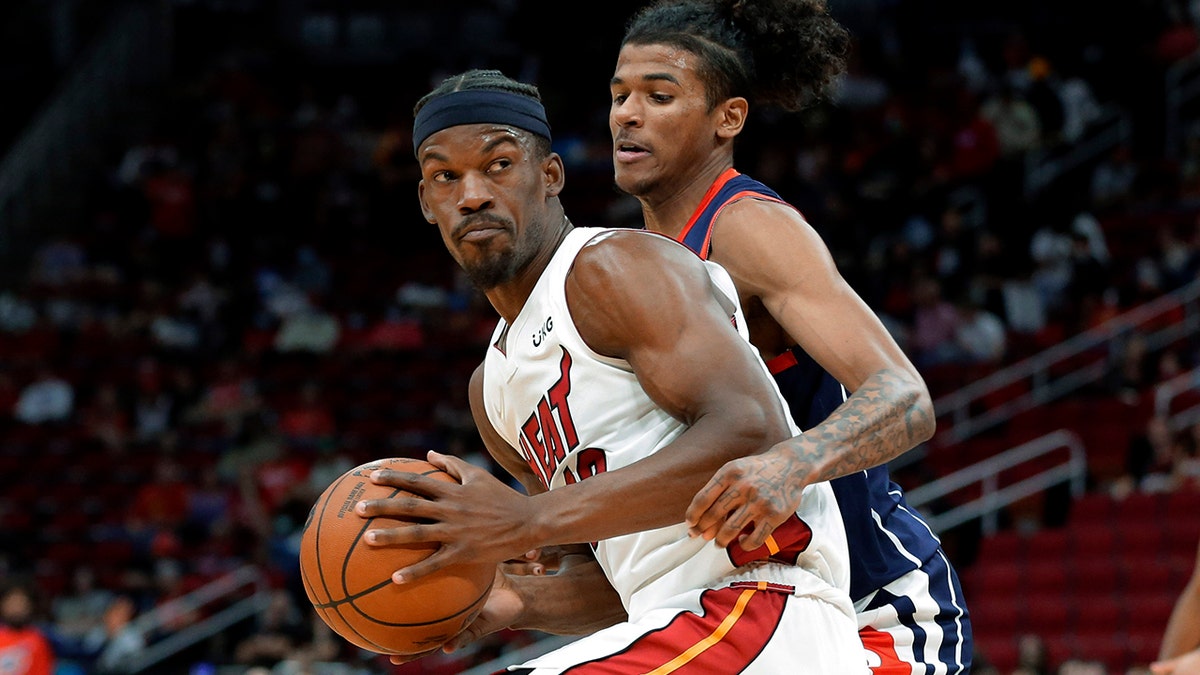NBA pro Enes Kanter Freedom 'disgusted' by Palihapitiya's Uyghur remarks
Boston Celtics center Enes Kanter Freedom reacts to Warriors part-owner Chamath Palihapitiya's comments on violence against Uyghur Muslims and discusses the NBA's economic ties with China.
Enes Kanter Freedom’s opposition to China’s nefarious labor practices and enslavement of Uyghur Muslims has been a recent narrative covered by the media — courtesy of the player’s determination.
Behind the scenes, China’s violations of human rights have long been a topic of contention for major U.S. companies and the NBA — making their silent opposition to doing business with China an ongoing two-faced partnership.
CLICK HERE FOR MORE SPORTS COVERAGE ON FOXNEWS.COM

Miami Heat forward Jimmy Butler, left, looks to get around Houston Rockets guard Jalen Green during the first half of an NBA basketball game Friday, Dec. 31, 2021, in Houston. (AP Photo/Michael Wyke)
Kanter Freedom reposted a report by ESPN that listed a roster of 17 NBA athletes currently dealing with Chinese brands that source their materials in China’s Xinjiang region.
The region has been the focus of human rights advocacy. Reportedly "more than a million Uyghurs and other minorities are held in detention camps" in Xinjian, highlighted by ESPN’s Mike Fish and Michael A. Fletcher.
Five of the major Chinese brands using the slave labor-generated materials from the region are Li-Ning, Anta, Peak and 361 Degrees. NBA All-Stars Klay Thompson, Jimmy Butler and D’Angelo Russell join the list of players that signed deals with the divisive brands.

Golden State Warriors guard Klay Thompson (11) runs downcourt after scoring against the Cleveland Cavaliers during the first half of an NBA basketball game in San Francisco, Sunday, Jan. 9, 2022. (AP Photo/John Hefti)
The NBA’s annual revenue from Chinese markets amounts to nearly $500 million.
While mum against China related to the pandemic, the U.S. government has described the activity in Xinjian as "torture."
"These groups also face abuses including forced labor, torture, involuntary sterilization, mass surveillance, family separation and repression of religious expression," the department noted in a statement.
Companies such as Nike and Adidas have also been cognizant of the issue in Xinjian, pulling back on their hand in the Chinese market over the years.
China’s response to the allegations has been more offensive than defensive.
"The so-called ‘forced labor’ issue is a century-old lie invented by the U.S. and other western institutions," said Chinese spokeswoman Liu Pengyu, "and personnel to restrict and suppress relevant Chinese enterprises and contain China’s development."
The call for human rights remains a motif throughout American sports media. As Kanter Freedom’s message remains taboo in NBA circles, the Association may be showing its hand on the duplicitous nature of doing business at the cost of violating fundamental human rights.

Miami Heat players Udonis Haslem, left, talks to Jimmy Butler during the first half of an NBA basketball game against the Denver Nuggets, Wednesday, Jan. 27, 2021, in Miami. (AP Photo/Marta Lavandier)
"Shame on the athletes that are aware of what is happening — who have affiliations with brands that get Xinjiang cotton," said co-chair of the Congressional-Executive Commission on China and U.S. Representative James McGovern (D-Mass.), as relayed by ESPN.
CLICK HERE TO GET THE FOX NEWS APP
"And we don’t use the word genocide lightly. … It is a genocide."








































